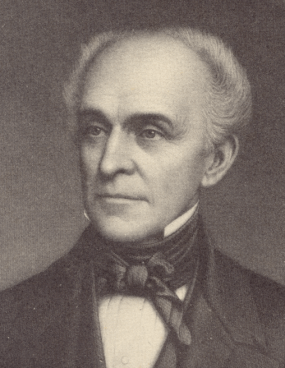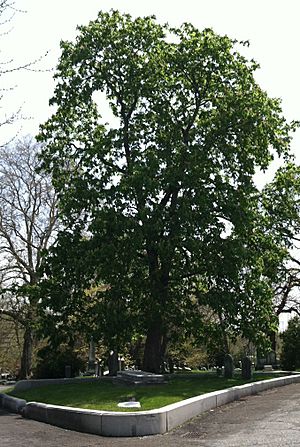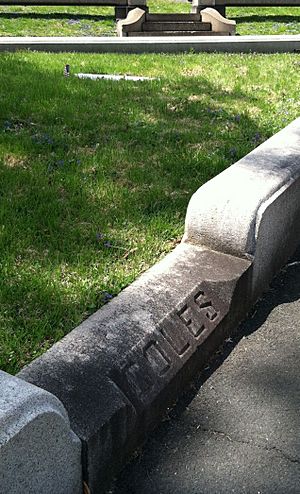Edward Coles facts for kids
Quick facts for kids
Edward Coles
|
|
|---|---|
 |
|
| 2nd Governor of Illinois | |
| In office December 5, 1822 – December 6, 1826 |
|
| Lieutenant | Vacant |
| Preceded by | Shadrach Bond |
| Succeeded by | Ninian Edwards |
| Private Secretary to the President | |
| In office January 1810 – March 1815 |
|
| President | James Madison |
| Preceded by | Isaac Coles |
| Succeeded by | James Payne Todd |
| Personal details | |
| Born | December 15, 1786 Albemarle County, Virginia, U.S. |
| Died | July 7, 1868 (aged 81) Philadelphia, Pennsylvania, U.S. |
| Political party | Independent |
| Spouse | Sally Logan Roberts (1809 to 1883) |
| Alma mater | College of William and Mary |
| Signature | |
Edward Coles (born December 15, 1786 – died July 7, 1868) was an American politician. He became the second Governor of Illinois (from 1822 to 1826). Edward Coles came from an old family in Virginia. When he was young, he lived near and worked with presidents Thomas Jefferson and James Monroe. He also served as a special helper, called a private secretary, to President James Madison from 1810 to 1815.
Edward Coles was against slavery his whole life. He inherited a large farm and enslaved people. But he decided to leave Virginia and move to the Illinois Territory to set his slaves free. In 1819, he freed 19 enslaved people and helped them get land. In Illinois, he first worked to stop slavery from spreading in the new state. Two years later, when he became Governor, he asked for slavery to end completely in Illinois. This goal was later achieved. Coles also wrote to and advised both Jefferson and Madison to free their own enslaved people. He also asked them to speak out against slavery. In his later years in Philadelphia, Pennsylvania, he helped historians understand the ideas of the early presidents.
Contents
Early Life and Education
Edward Coles was born on December 15, 1786. His birthplace was Enniscorthy, a large farm in Albemarle County, Virginia. He was the youngest boy among ten children of John Coles and Rebecca Tucker. Edward went to Hampden-Sydney College and then to the College of William and Mary.
At William and Mary, Edward was greatly influenced by his teacher, Bishop James Madison. The bishop believed slavery was wrong. Young Edward decided he would not own enslaved people. He also decided he would not live in a place where slavery was accepted. However, he kept these thoughts secret from his father. He feared his father might change his will and not leave him enslaved people. This would prevent Edward from freeing them later.
When his father died in 1808, Edward inherited 12 enslaved people and a large farm. After his father's affairs were settled, Edward told his family he planned to free the enslaved people. This caused a lot of worry. Virginia law at the time made it hard to free slaves. Freed slaves had to leave the state within a year. Edward first thought about freeing them in Virginia, but then changed his mind.
He tried to sell his farm in 1809. He wanted to move to the Northwest Territory, where slavery was not allowed. But he couldn't sell the farm for a good price. So, he continued to own it and the enslaved people for a while. He refused to trade his enslaved people for other property. He also kept his plans secret from the enslaved people themselves, as his family asked.
Family Connections
The Coles family was one of the oldest and most important families in Virginia. Edward's great-grandfather, Walter Coles, became rich as a merchant. His grandfather, John, helped establish the city of Richmond. Edward's father, John II, turned their farm, Enniscorthy, into a successful business.
Edward's older brother, Isaac A. Coles, worked as a private secretary for both President Thomas Jefferson and President James Madison. Thomas Jefferson's home, Monticello, was nearby. Also, Dolley Payne Todd Madison, the wife of James Madison, was Edward Coles's first cousin. Because of this, Edward often visited their home, Montpelier.
Career in Public Service
Working for the President
In January 1810, President James Madison asked Edward Coles to be his private secretary. Edward's brother, Isaac, had been doing this job. Edward served Madison until March 1815. Being the president's secretary meant Edward had to delay his plans to free his enslaved people.
However, Edward and President Madison became good friends. Edward often spoke openly with Madison. He greatly admired the president. As Madison's assistant, Edward gained a lot of political experience. He was Madison's main contact with Congress. He also managed many important tasks for the government.
In 1811, Edward Coles met John Adams during a trip. Coles helped improve the friendship between Adams and Thomas Jefferson. After the War of 1812 ended, Coles resigned in February 1815 due to ongoing health issues.
After recovering, Coles traveled to the Northwest Territory in 1815. He was looking for land to buy. He wanted to create a home for himself and a place for the enslaved people he still planned to free. He bought some land in the Missouri Territory for investment. Then he returned home to Virginia.
President Madison later asked Coles to go on a diplomatic trip to Russia in 1816-1817. Coles successfully completed his mission. While in England, he met John Quincy Adams and social reformer Morris Birkbeck. Coles spoke so highly of Illinois that Birkbeck bought land there and started a settlement. Coles also wrote about how slavery in America compared to serfdom in Russia. This trip did not change his mind about freeing his slaves.
Letters to Thomas Jefferson
In 1814, Edward Coles wrote a letter to his neighbor, former President Thomas Jefferson. Coles asked Jefferson to start a new effort to end slavery in Virginia. Jefferson's reply is a very important document for understanding his views on slavery. Jefferson, who was 71 and mostly retired, refused Coles's request. He told Coles to stay in Virginia and help end slavery over a long time. Coles was clearly disappointed by Jefferson's answer.
Coles believed that older, respected leaders like Jefferson were best suited to lead the fight against slavery. He felt that young people might not have enough influence or courage to go against popular opinion. Jefferson, however, thought it was a task for the younger generation. He said his "prayers" were the only help an old man could offer. Coles disagreed, pointing out that Benjamin Franklin had worked actively on important issues even in his old age.
Moving to Illinois
In 1817, Coles sold his farm in Virginia. He turned down President James Monroe's offer to continue as his private secretary. Instead, Coles went on another trip to the Northwest Territories in 1818. He bought land in the American Bottom in Illinois Territory. Coles also helped write the Illinois Constitution. He worked with others to stop a group that wanted to allow slavery in the new state.
Coles then went back to Virginia. He was ready to show how much he was against slavery. He planned to free the enslaved people he had inherited. In March 1819, Edward Coles was ready to move to the Illinois Territory. President Monroe had appointed him to a land office job in Edwardsville.
Coles sent his trusted coachman, Ralph Crawford, ahead with wagons and 16 other enslaved people. They traveled north to Pennsylvania. Coles traveled separately. They met in Pennsylvania. There, they boarded boats and traveled on rivers toward Illinois. West of Pittsburgh, Coles gathered his enslaved people. He told them they were now free. He also told them he would give land to each family head. This moment was later shown in a painting at the Illinois State Capitol.
The Coles group arrived in Edwardsville in May 1819. Coles began his job. He also finished freeing the enslaved people. He bought land and gave each freed family head 160 acres. Coles also helped them find jobs and gave them support. He became known for being fair and honest in his land office job.
Governor of Illinois
Coles ran for governor in the 1822 election. He was surprised when he won by a very small number of votes. He had thought he lost the election. President Madison sent him a gift and a note. Madison said he was sure Coles would "walk in a straight path" as governor.
In his speech as governor, Coles clearly asked for slavery to end in Illinois. He also wanted to change the Black Code, which limited the rights of Black people. He also supported building canals and helping farming and education. Slavery was a very important issue. The state's first constitution only allowed slavery in salt factories until 1825. A group that supported slavery wanted to change the constitution to make Illinois a slave state.
Coles strongly opposed this. He used all his governor's salary ($4000) to fight against the idea of holding a new constitutional meeting. He led a group of anti-slavery citizens, religious leaders, and lawmakers. They worked hard to show that the arguments for slavery were false. On August 2, 1824, Illinois voters rejected the idea of a pro-slavery meeting.
However, Coles faced challenges. Lawmakers who supported slavery refused to approve his choice for secretary of state. Also, a lawsuit was brought against Coles. His opponents claimed he hadn't paid a tax on his freed slaves years earlier. The Illinois Supreme Court eventually ruled that he didn't need to pay the tax. When his term ended in December 1826, Coles reminded lawmakers to get rid of all parts of slavery in the state. He also urged them to fund a canal and a prison.
After being governor, Coles briefly returned to Virginia. Then he went back to his farm near Edwardsville. He focused on farming and business. He also traveled to Virginia and Philadelphia to visit family and friends. He ran for Congress in 1831 but lost. He felt very sad about this loss and moved back east.
Return to Virginia
Coles decided to leave Illinois after his election loss. He visited Virginia, which was debating slavery after Nat Turner's rebellion. Coles wrote to Thomas Jefferson Randolph, urging him to support freeing slaves. He said slavery hurt Virginia's economy. At the end of 1831, Coles visited James and Dolley Madison. Madison told Coles he wanted to free his own enslaved people. He asked Coles for advice on how to do this while still providing for Dolley after his death. However, Madison died in 1836 without freeing any of his slaves. They were left to his wife, Dolley.
Later Life in Philadelphia
Coles moved to Philadelphia in 1832. He liked the city's active social and intellectual life. Slavery was also not present there. At age 46, Coles married Sally Logan Roberts in 1833. They had three children: Mary, Edward Jr., and Roberts. The family lost much of their money during a financial crisis in 1837. Coles's family farm in Virginia also burned down in 1839.
Coles never returned to politics. He didn't like the new political party system. But he was happy when Abraham Lincoln, whom he remembered as a young lawyer from Illinois, became president. The elderly Coles briefly met the new president. Coles also spoke out against Senator Stephen A. Douglas's statements about slavery in Illinois.
In his later years, Coles focused on history. He was known as one of the few people who had known both Madison and Jefferson well. He worked to protect their reputations as supporters of the ideas of the American Revolution. Coles had tried to convince both Jefferson and Madison to free their enslaved people. He was surprised when Madison did not. Coles later learned that Madison had been advised to leave his enslaved people to his wife, Dolley. Dolley, facing her own money problems, did not free any enslaved people when she died in 1849.
Sadly, Coles's younger son, Roberts, moved back to Virginia in 1860. He became a slave owner and joined the Confederate army. Roberts Coles died in battle in 1862 during the Battle of Roanoke Island.
Death and Legacy
Edward Coles died at age 81 in Philadelphia on July 7, 1868. Even though he was heartbroken by his son's death fighting for the Confederacy, Coles lived to see slavery ended. This happened with President Lincoln's Emancipation Proclamation and the Thirteenth Amendment. Coles also lived to see his older son, Edward Coles, Jr., get married. Edward Coles Jr. became a well-known lawyer in Philadelphia.
The Coles family grave is at Woodlands Cemetery in Philadelphia. Edward, his wife Sally, and their three children are buried there. His daughter, Mary Coles, helped start a school for women who wanted to serve the church. In 1895, Mary Coles arranged for her brother Roberts to be reburied at the family gravesite.
Coles was one of the very few slave owners who freed his enslaved people. He did this because he believed in the ideas of freedom and equality from the American Revolution. He is also remembered for trying to convince Thomas Jefferson and James Madison to end slavery.
Coles County, Illinois was named after him. Also, an elementary school in Chicago is named for him. During his lifetime, a town in Illinois was named Coles Grove. The Governor Coles State Memorial is located in Edwardsville, Illinois. The Illinois Human Rights Commission also offers a scholarship to law students in his honor.
Original Sources
- Coles, Edward, (1856). History of the Ordinance of 1787, (primary source) Historical Society of Pennsylvania, pp. 33, Url
- The Coles Family papers, containing correspondence, various papers and materials belonging to Edward Coles, are available for research use at the Historical Society of Pennsylvania.



